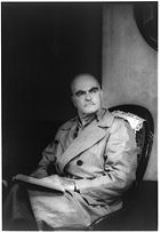
playwright
and novelist. He received three Pulitzer Prizes, one for his novel The Bridge of San Luis Rey
and two for his plays Our Town
and The Skin of Our Teeth
, and a National Book Award
for his novel The Eighth Day.
Wilder was born in Madison
, Wisconsin
, the son of Amos Parker Wilder, a US diplomat
, and Isabella Niven Wilder. All of the Wilder children spent part of their childhood in China
because of their father's work.
Thornton Wilder's older brother, Amos Niven Wilder
, was Hollis Professor of Divinity at the Harvard Divinity School
, a noted poet, and foundational to the development of the field theopoetics
.
Literature is the orchestration of platitudes.![]()
I would love to be the poet laureate of Coney Island.![]()
Many plays — certainly mine — are like blank checks. The actors and directors put their own signatures on them.![]()
Love is an energy which exists of itself. It is its own value.![]()
Many who have spent a lifetime in it can tell us less of love than the child that lost a dog yesterday.![]()
Love, though it expends itself in generosity and thoughtfulness, though it gives birth to visions and to great poetry, remains among the sharpest expressions of self-interest. Not until it has passed through a long servitude, through its own self-hatred, through mockery, through great doubts, can it take its place among the loyalties.![]()
I am not interested in the ephemeral — such subjects as the adulteries of dentists. I am interested in those things that repeat and repeat and repeat in the lives of the millions. ![]()
Like all the rich he could not bring himself to believe that the poor (look at their houses, look at their clothes!) could really suffer. Like all the cultivated he believed that only the widely read could be said to know that they were unhappy.
![]()
Soon we shall die and all memory of those five will have left earth, and we ourselves shall be loved for a while and forgotten. But the love will have been enough; all those impulses of love return to the love that made them. Even memory is not necessary for love. There is a land of the living and a land of the dead and the bridge is love, the only survival, the only meaning.
![]()
Style is but the faintly contemptible vessel in which the bitter liquid is recommended to the world.
![]()

